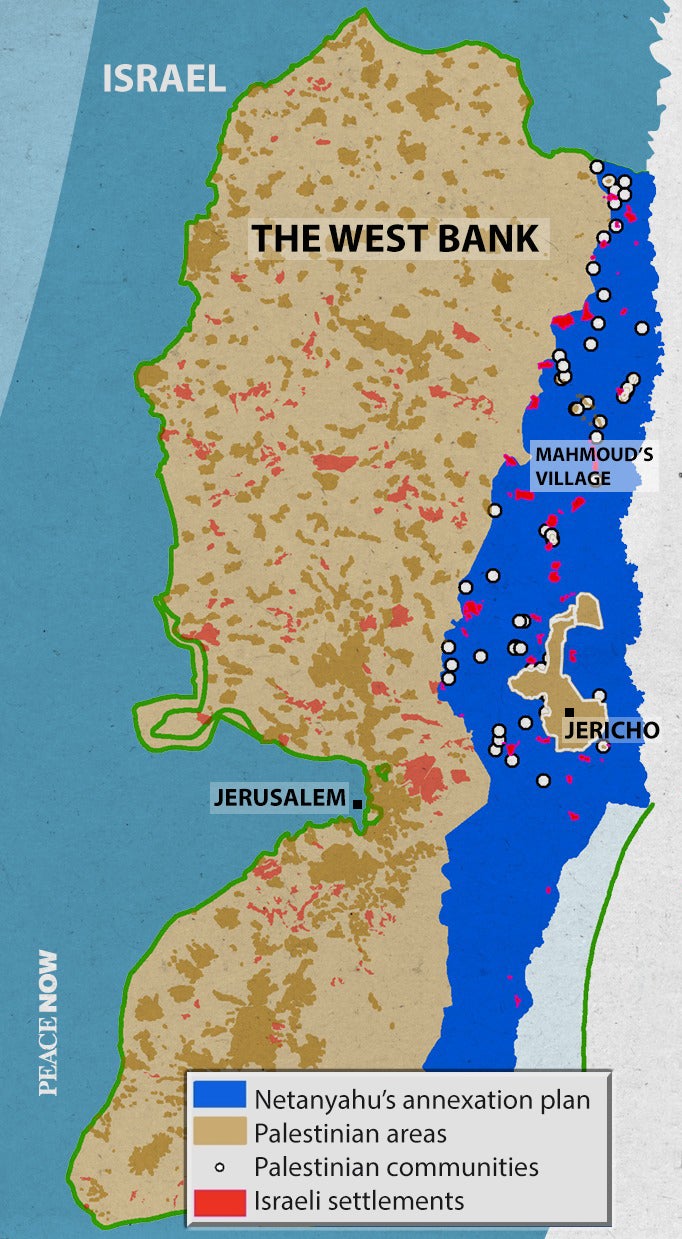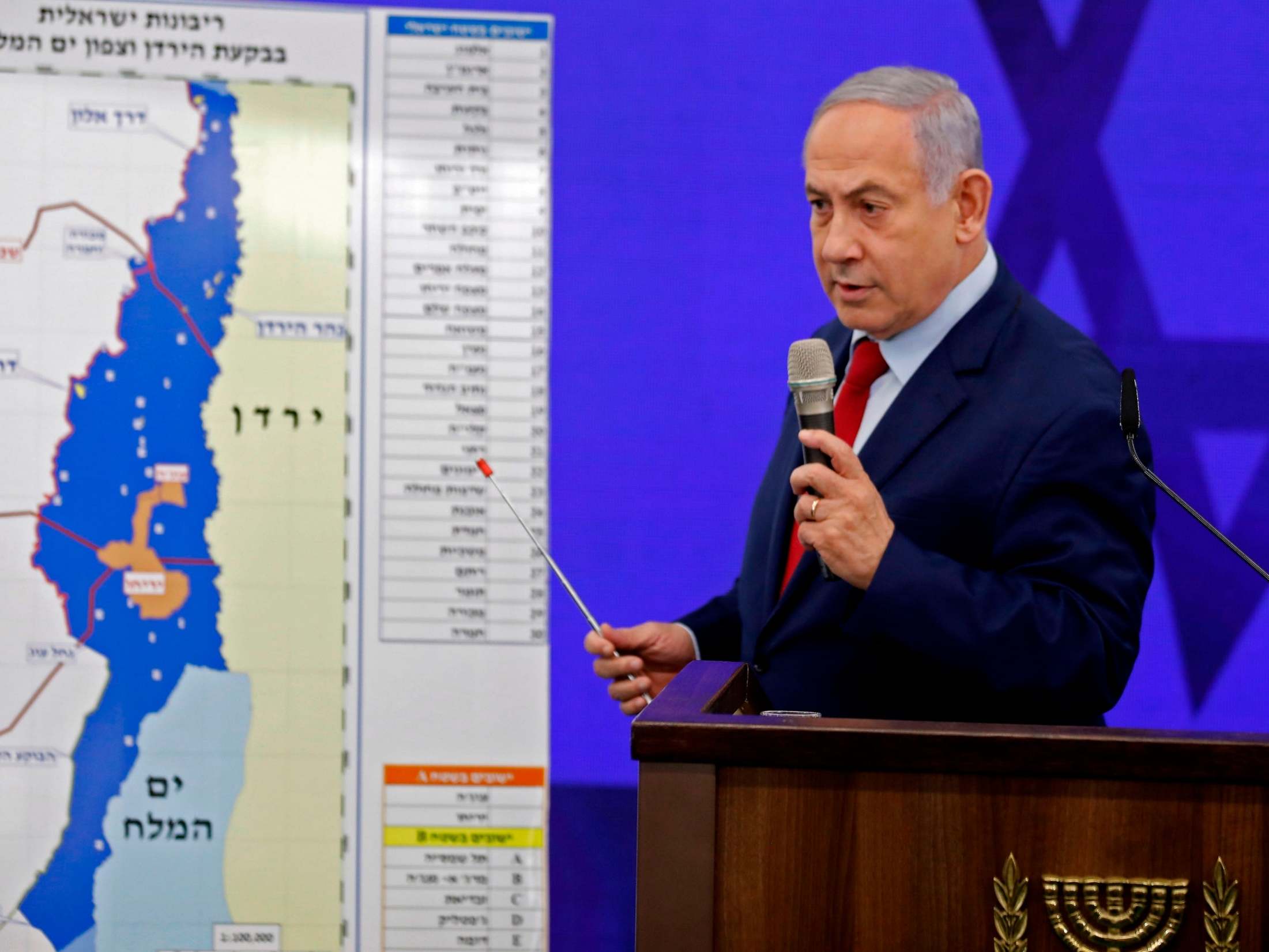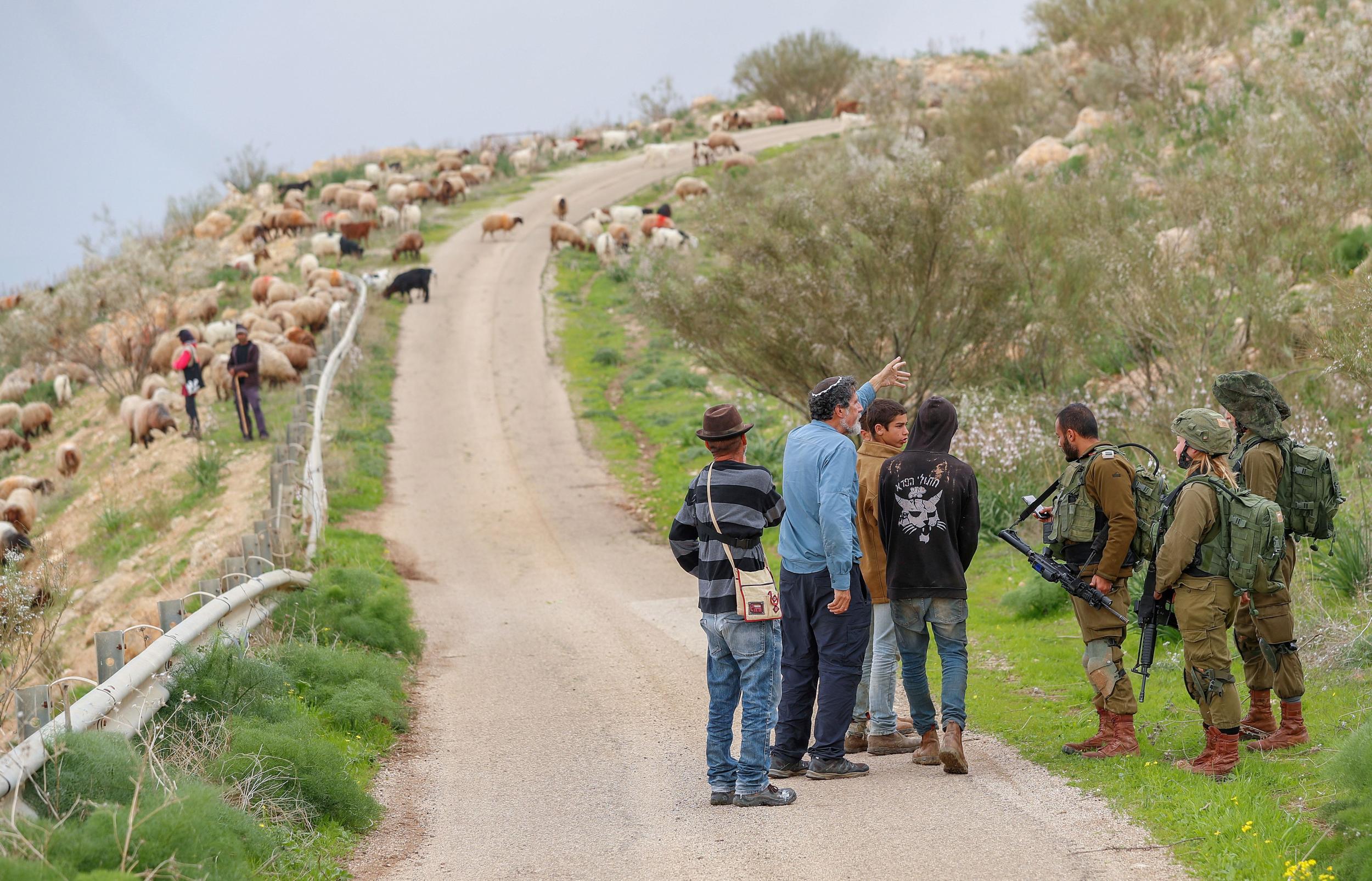‘The death knell to peace’: Will Netanyahu really annex the Jordan Valley?
For Palestinians living in the strategic area, annexation is already on the horizon – but will the Israeli prime minister take the next step? Bel Trew reports


For the family of Palestinian shepherd Mahmoud, whose home in the occupied West Bank has been demolished by Israel five times, annexation has already effectively begun.
Living in the Jordan Valley – which was captured by Israel in a 1967 war – the 39-year-old says the noose has steadily tightened around his tiny village that is bookended by two Israeli settlements.
The strategic, mineral-rich valley runs around 100 km (62 miles) along the border with Jordan and is home to lush agricultural lands, much of it tilled by more than 12,000 Israeli settlers. It has long been in the sights of Israel’s hardliners, including Benjamin Netanyahu, who in September went as far as to draw a map of annexation for the area, placing Mahmoud’s Palestinian community and 46 others firmly on the Israeli side of the line.
This week, despite international and Palestinian uproar, the Israeli prime minister doubled down on this threat to start the process of imminently and formally annexing the Jordan Valley starting 1 July. On Thursday, he made it clear any Palestinians, like Mahmoud, living on land set to be annexed would not be given Israeli citizenship.
Time is running out if Israel needs the US administration to back the move: US elections in November might see Israel’s closest ally and most pro-Israel president – Donald Trump – voted out.

But many fear the highly contentious plan could spark another Palestinian Intifada, or uprising, and a conflict with Israel’s Arab neighbours, profoundly altering the map of the Middle East.
“Annexation would be the absolute death knell of a two-state solution and would mark the rise of the 21st century apartheid one state,” Michael Lynk, the UN special rapporteur for the situation of human rights in the occupied Palestinian territory told The Independent. He likened the seriousness of annexation under international law to the crime of genocide.
“‘States could consider sanctions [if Israel moves forwards]” he added.
“Annexation deals a body blow to international law.”
On the ground, Mahmoud’s family-of-nine have no idea what Mr Netanyahu’s plans mean practically for their future.
The Israeli prime minister confirmed in an interview on Thursday he would not be annexing the Palestinian city of Jericho within the Jordan Valley, which he said he would leave as an "enclave" surrounded by Israeli territory.
However, he dismissed all the other Palestinians – like Mahmoud – who live in the Jordan Valley outside of Jericho, whose land will become part of Israel but without the right to citizenship. Rights groups estimate they number 4,300 people and live across 47 villages.
“There’s a cluster or two,” Mr Netanyahu told the Hayom newspaper.
“You don’t need to apply sovereignty over them, they will remain Palestinian subjects if you will. But security control also applies to these places,” he added.
And so Mahmoud fears his situation will only get worse. Like the other Palestinians living in the valley, the family already faces difficulty accessing water, electricity, education and healthcare services due to Israeli restrictions.
“They have been actively working on displacing us from the region for years, in every way they can,” he told The Independent, providing copies of demolition orders, court summonses and photos of the raids on his homes.
Right now he is grappling with a January demolition order against his family’s mud-brick house on the grounds it is “harming archaeology”. He was sent a March summons to attend an Israeli court session or risk a 2,000 shekel (£470) fine and 6 months in jail because he planted an olive tree.
According to both Palestinian and Israeli rights group, Israel wants to enable de facto annexation here and so has actively taken measures to encourage them to leave “by making their lives intolerable”.
B’Tselem rights monitor says that Palestinians are barred from entering 85 per cent of the Jordan Valley and northern Dead Sea area, where despite being in the West Bank, there are sweeping closed military zones, municipal jurisdictions for Israeli settlements, nearly a dozen firing zones and Israeli nature reserves.
Mahmoud says this means his family cannot move freely. The children also fear Israeli settlers from neighbouring Beka’ot settlement, as well as soldiers who frequently hassle them over building permits which are impossible for Palestinians to secure.
“We can do nothing but stand on our lands against the threats of being [physically] forced from here if they go ahead with formal annexation,” he says.
Israel captured the West Bank in the 1967 Middle East war. There are now nearly 500,000 Jewish settlers living there.
Mr Netanyahu and his hardline supporters have long spoken of the desire to declare sovereignty over it but have yet to formally claim it as an Israeli territory due to stiff international opposition.
The annexation of land captured in war is illegal under international law. The move is seen in the capitals of world powers as an obstacle to peace between the Israelis and Palestinians, and the creation of a viable Palestinian state, which the Palestinians hope will include the West Bank, Gaza and East Jerusalem.
With the seeming support of Washington, however, Mr Netanyahu began taking concrete steps towards the annexation of the Jordan Valley last year.
In September he drew up a map and has recently set a schedule for starting the process, after receiving what many see as a “green light” from the Trump administration when they released what has been called the most pro-Israeli peace plan to come out of the White House.
The Trump team’s vision envisages a future where 30 per cent of the West Bank (an area home to over 327,000 Palestinians, according to Israeli watchdog Peace Now) is handed to Israel, with the remaining land, parts of East Jerusalem, Gaza and a few other envelopes making up a Palestinian “statelet”.
The deal – which was roundly rejected by the Palestinians – was supposed to require both sides to sign.
But shortly after the plan’s launch, US ambassador to Israel David Friedman said Israel “does not have to wait” to annex parts of the West Bank. Since then the administration has said it is up to Israel to decide.
On Monday, a day after appearing in court for the opening session of his controversial corruption trial, the prime minister told a meeting of his right-wing Likud Party he intends to press ahead with applying Israeli law to settlements and the Jordan Valley as early as 1 July.
“This is an opportunity that we will not let pass,” Mr Netanyahu was reported as saying by Israeli media. “We have a target date and we won’t change it,” he declared.
But despite this, many still question the seriousness of Mr Netanyahu’s pledges which have sparked a tidal wave of concern across the world that could have serious implications on shores closer to home. Mr Netanyahu’s and Mr Gantz’s offices did not reply to The Independent’s request for comment.
There has been uproar from the United Nations and even reports the European Union is mulling sanctions.
UN special rapporteur Mr Lynk said it could also spark problems closer to home as it threatened decades-old peace deals with Israel’s neighbours.
“Half the population of Jordan are of Palestinian descent, the issue of Palestinian rights is one of the most important there,” he said.
Jordan’s usually composed King Abdullah II made a rare public denouncement in a recent interview, saying annexation would create more “chaos and extremism” in the region, end the long-stalled peace process and destroy hopes of a Palestinian state.
He said it could also lead to a “lead to massive conflict” with Jordan.
Even Israel’s top generals have warned that a formal declaration of annexation could jeopardise the country’s own security.
Israel’s army radio reported this week that Major General Kamil Abu Rukun, Israel’s military liaison to the Palestinians, warned the country’s defence minister of a “wave of terror” attacks if Mr Netanyahu followed through with the plan. He added that the Palestinian Authority (PA) would probably cancel all security arrangements.
President Mahmoud Abbas appeared to do just that when he announced last Tuesday that all agreements with Israel – including security – were cancelled.
What this means in practice is unclear since Mr Abbas has made similar threats over a dozen times during the last five years. However Palestinian officials told The Independent PA forces had begun withdrawing from “Area B” – that makes up 22 per cent of the West Bank, where Palestinians have civil control but Israel is responsible for security.
“If they push ahead with annexation it means there is no international law in the world, there are no rights except the right of conquest,” Nabil Shaath, an adviser to Mr Abbas.
“We are not going to be bound to agreements because the Israelis are flagrantly violating them.”
Annexation... means there are no rights except the right of conquest
All these ripples may be too huge for Prime Minister Netanyahu, who is only just clinging onto power after signing a fraught coalition deal with his chief rival Benny Gantz while battling bribery, breach of trust and fraud charges across three corruption trials.
Anshel Pfeffer, an Israeli journalist and biographer of the prime minister, said it would be an uncharacteristic move for such a cautious man who “doesn’t like rocking the boat”.
“People who have spoken to Bibi haven’t come away with a clear idea of what he truly wants,” he told The Independent using Mr Netanyahu’s nickname.
“Going too far would ruin his achievement of taking Palestinian issues off the table. “
Mr Pfeffer suggests that rather than annexing the whole of the Jordan Valley, Mr Netanyahu might try a more face-saving measure, such as selecting a few West Bank settlements geographically closer to Israel.
In the USA, former US ambassadors to Israel were also reluctant to believe Mr Netanyahu would go that far because he would not have the full blessing of Washington.
James B Cunningham, who served as ambassador from 2008 – 2011 and now works for the Atlantic Council, said that “there wasn’t much appetite” for annexation even from pro-Israeli lobbying groups. He said figures like Trump’s son-in-law Jared Kushner, who co-authored the peace deal, have since urged caution.
“It is a question of how much additional leverage this gets for Trump ahead of the US elections when going down this path has so many negative consequences,” he told The Independent.
That said it may be too late.

In Gantz and Netanyahu’s power-sharing coalition agreement, bar fighting the coronavirus pandemic, the only issue the new unity government is permitted to address for the first six months is annexation.
With cabinet portfolios divided between Netanyahu’s and Gantz’s camps, the prime minister is under mounting pressure to keep his hard-right pro-settler support base happy. He is also running out of time: from November 2021 he has to hand the baton of the premiership to Mr Gantz.
Mr Gantz has cautioned against unilateral annexation of the West Bank in carefully worded statements that only supports such action “in coordination with the international community”. However the unity deal allows Mr Netanyahu and his Likud party to put forward annexation legislation as a private bill, circumnavigating any pushback from Mr Gantz and his supporters.
“The fact that this is the single issue they have put in the coalition agreement bar the coronavirus is significant… Also Gantz has no way of stopping it even if there is a vote,” said Lara Friedman, president of the Foundation for Middle East Peace and a former US foreign service officer.
“The only way this doesn’t move forward is if Bibi throws himself on his sword, which means taking on his right-wing supporters in Israel and in the US.”
If Trump loses the US elections, Israel will have lost its most amenable US president. There are fears among those who support annexation that Joe Biden, who has expressed reservations, might “roll things back”, Ms Friedman said.
In these circumstances, it might be hard for Mr Netanyahu to backtrack on so many promises, according to Daniel C Kurtzer, a Princeton professor who served as US ambassador from 2001 to 2005.
“There is a good chance that Netanyahu will feel pressured to move forward because the coalition agreement opens the road for that,” Mr Kurtzer said.
“Unless there is significant external pressure it will be hard for him to just walk away.”

Nearly 10,000km (6,000 miles) east of the White House in the depths of the Jordan Valley, annexation simultaneously means everything will change and nothing at all.
Given the restrictions already on the lives of Palestinians like Mahmoud, formal annexation is only the final de jure step to realise what decades of facts on the ground have effectively meant.
For his family members he says they already feel like imposters on their own lands.
“We have no idea what this will mean in practice,” he said over the phone. “All we know in this occupation, power is above the law.”
Join our commenting forum
Join thought-provoking conversations, follow other Independent readers and see their replies
Comments
Bookmark popover
Removed from bookmarks